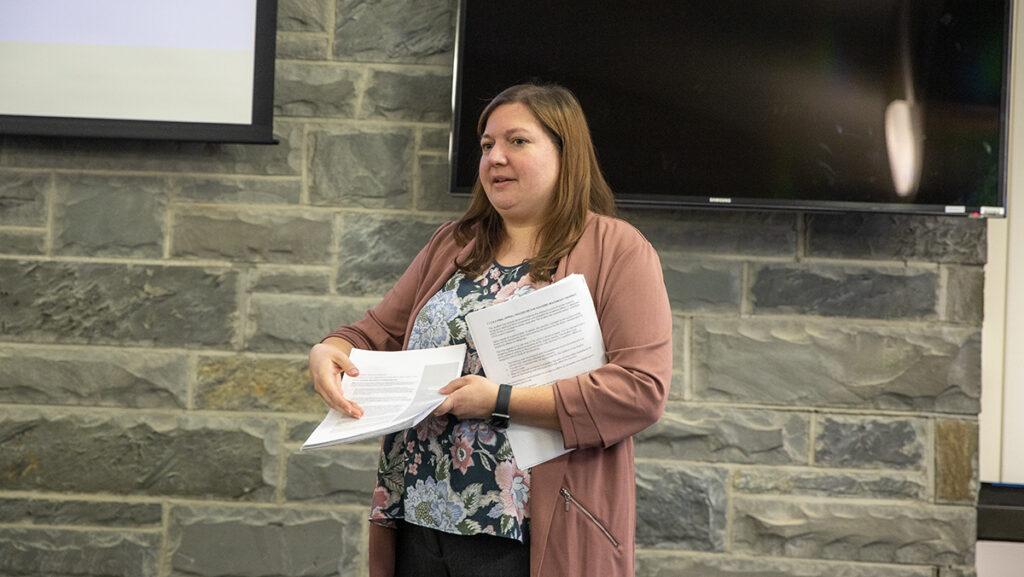The Student Governance Council met April 10 to discuss refreshing Terrace Residence Halls’ restrooms, changes to the academic misconduct policy and issues students are facing with campus living.
The meeting began with guest speaker Laura Davis, director of Residential Life and Judicial Affairs, who discussed a recent survey sent out April 10 to all students living on campus about residential living experiences. The survey, called the Skyfactor Benchworks Assessment, has been used in the past, prior to COVID-19, and has just recently been reintroduced.
Davis said the survey is still available and only takes about 20 minutes to complete. The SGC discovered during the meeting that the survey was getting sent to people’s junk mailboxes and Davis said ResLife will look into the issue as soon as possible.
“We’re really hoping to get feedback to understand and have data to support … what we’re getting as more informal feedback,” Davis said. “This is the first survey we can compare to national benchmarking since COVID-19.”
A project currently in development is repairing Terrace restrooms. Davis said employees in ResLife have spent the last year collecting data about what students want to see changed in dorms and students were commonly complaining about dorm restrooms.
“We pulled out the data, about 160 responses, and themed the data,” Davis said. “The top theme was bathrooms, which … reiterated what informally a lot of us in residential life thought we were hearing in [students’] day-to-day experiences.”
Davis said students stressed the issues of all-gender restrooms, single-use restrooms and renovations to restrooms in dorms and cleanliness in the survey.
“You have grout that may be sterilized every day, but it’s faded, dark brown grout and that looks disgusting,” Davis said. “That is not going to give you confidence and feel good about the place you’re in, even if custodians are cleaning and sanitizing.”
The SGC was shown an example of current Terrace’s restrooms. Davis highlighted how the restrooms have low lighting, short stall doors, tiles with faded grout and a muted color palette. Davis said the new restrooms would include a new color palette on the walls, taller and lower stall doors, an epoxy floor and a new countertop.
Davis said the restrooms will be refreshed, not remodeled. She said the project would reshape and enhance restrooms rather than tear down walls or install new fixtures.
Davis said the college is not doing a remodel because of budget concerns. She said that in order to do remodels like in the Towers restrooms in the last few years — which cost $300,000 per floor — Terraces restroom remodels would cost $500,000 per restroom, equating to $1,000,000 per floor.
“The reality is that [Terraces renovations are] just not feasible when you think of how cost- and time-prohibitive a project like that would [be],” Davis said. “Instead, what we started to do was say, ‘What would a refresh do that would meet needs in a different way?”
Davis said additional aspects of the project include installing water bottle filling stations, new paint and lighting in the hallways and new treads in the most highly trafficked stairwells. She said the refresh will not include any current single-user restrooms and would span summer 2023 and summer 2024. Plans for expanding all-gender restrooms would be included. Davis said the projects are pending budget approval.
Katie Newcomb, assistant director in the Office of Student Conduct and Community Standards, presented about changes possibly coming to the academic misconduct process. Newcomb said the academic misconduct process has not been updated in two years and does not align with other student conduct processes. She said the office wants to better define the process and simplify the language.
“If you read through the old academic misconduct process, it’s a little clunky,” Newcomb said. “We wanted to fix that so that any student or faculty could read through the Code of Conduct and have a clear understanding of what the process looks like.”
The student conduct violation process currently functions under an agreement process where if a faculty member suspects a student of plagiarism or cheating, they discuss the issue with the student. If the incident is identified as academic misconduct, the student signs a form that gets sent to the Student Conduct office and the student is placed under academic probation.
“My office would then send a letter, without ever meeting the student, that says, ‘You are under academic probation,’” Newcomb said. “Quite frankly, it’s not a great process. … It requires this agreement that if the student doesn’t agree we have to send it to a review board that takes a lot of time, energy and resources.”
The process has now been turned into an administrative hearing process. Once students are referred to student conduct, they have a chance to meet with a member of the board to discuss their perspective on the incident.
In the old process, second-time offenders would attend an academic misconduct sanction hearing, which was never clearly defined. Now, the office will collaborate with students’ deans to discuss reparations. The student then has the option to meet a conduct review board to oppose any claims. The new code clarifies these processes better than the old.
Previously, the board consisted of two students, two faculty and one staff member. The updated wording changes the number down to one student, one faculty and one staff member. Like in the old process, anyone chosen has to go through a process to identify any potential conflicts of interest.
“My office always struggles to find board members,” Newcomb said. “The goal is to have equal representation of faculty and students.”
During the open agenda, SGC had a casual discussion about rats being spotted in West Tower and if ResLife is aware of this issue. Rishabh Sen, vice president of campus affairs, spoke with Bonnie Prunty, vice president of Student Affairs and Campus Life, the prior week about how the college is countering this threat.
“Rats are on their radar and they mostly go to corner rooms,” Sen said. “They are dealing with it by building traps and partnering with a third party company that is being very proactive, not just reactionary, in terms of dealing with the rats.”









